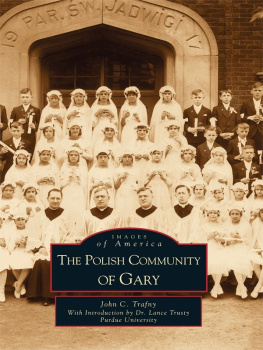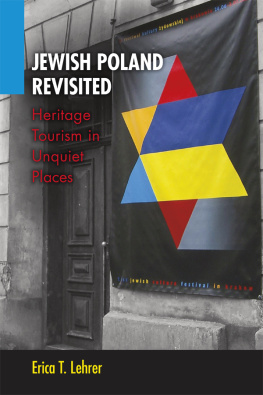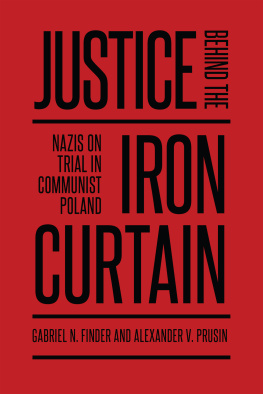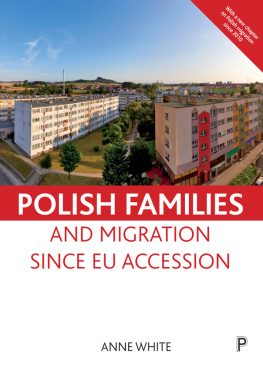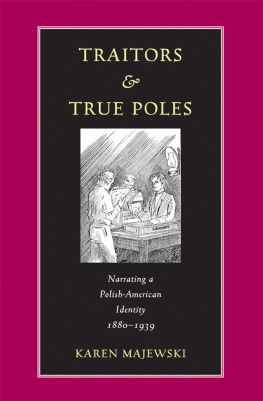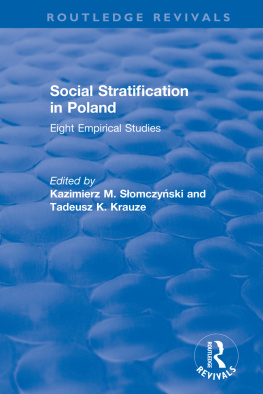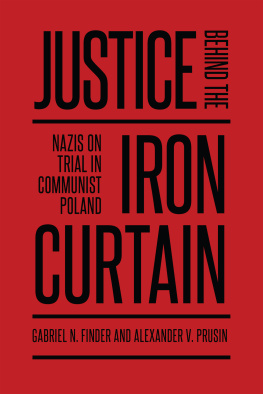Opposite Poles
Library of Congress
Cataloging-in-Publication Data
Erdmans, Mary Patrice.
Opposite Poles : immigrants and ethnics in Polish Chicago, 19761990 / Mary Patrice Erdmans
p. cm.
Includes bibliographical references and index.
ISBN 0-271-01735-X (cloth : alk. paper)
ISBN 0-271-01736-8 (pbk. : alk. paper)
1. Polish AmericanIllinoisChicagoHistory20th century.
2. ImmigrantsIllinoisChicagoHistory20th century.
3. Chicago (Ill.)Ethnic relations.
I. Title F548.9.P7E73 1998
977.3110048185dc21 97-17949
CIP
Copyright 1998
The Pennsylvania State University
All rights reserved
Published by
The Pennsylvania State University Press,
University Park, PA 16802-1003
It is the policy of The Pennsylvania State University Press to use acid-free paper for the first printing of all clothbound books. Publications on uncoated stock satisfy the minimum requirements of American National Standard for Information SciencesPermanence of Paper for Printed Library Materials, ANSI Z39.48-1992.
To my grandmother, Helen Frances Grasinski, for her elegance and strength
CONTENTS
I did not work or write in isolation, so there are of course many people I need to thank. I am grateful to my friends, colleagues, and teachers in Chicago who encouraged me in the early stages of this work: Celia Berdes, Leyla Gungor, and Wayne Severson, for having plucky souls and being damn good friends; Anna Domagala and Mariusz Szajnert for help translating; and Carol Heimer, Albert Hunter, and Arthur Stinchcombe for their shrewd questions, playful discussions, and incisive criticisms.
My understanding of the Polish community in Chicago would not have been possible without the generosity of all those who shared their memories, musings, and files. Getting to know the Polish immigrants and Polish American ethnics has given me a greater appreciation of home and kinfolk. In Poland, the gracious hospitality of Halina Gala, Jurek and Krystina Przystawa, and Marysia Kowalska fed my love for this indomitable nation.
I am indebted to those who helped me manage my life and thoughts while writing the manuscript in Greensboro: Jeanne Jones and John Malone, for their open refrigerator, and special thanks to Jean, for her gutsy piano playing and her directive to write about my work with as much passion as I talked about it; Janice Tulloss, for Ernie-sitting; Andy Brod, for long hikes and late-night editing; David Mitchell, Bill Markham, and Rebecca Adams, for their comments on sections of the manuscript; Steven OBoyle, for suggesting the title; and Julia Capone, for helping me get it wrapped up and out the door.
I would also like to thank those who helped me turn the pages of words into a finished product: Stanislaus Blejwas and Mary Kelly, for their insightful reviews; Ewa Wolynska, the special collections archivist at Central Connecticut State University; Robert Gaines, documents librarian at the University of North Carolina at Greensboro; and Peter Potter and Patricia Mitchell at Penn State Press.
And then, there are those I would like to thank for a lifetime of support: the Erdmans clanJim, Rosemarie, Andrew, Diane, Curt, Evan, Veronica, Rachel, David, Kathy, Matthew, Michael, Laura, Chris, Jeremiah, Elizabeth, Hannah Rose, Paul, and Vickyfor reminding me that I am simply one among many; special thanks to Jimmy, for bringing me supplies and teasing me into laughter; my parents, James and Angel Erdmans, for their steadfast love, strong faith, and for giving me the cabin when I needed it most; to my buddy, Eddythough I promised a dedication I am at least delivering an acknowledgment; and finally, my aunts, the Grasinski girls, for just being beautiful and reminding me that my grandmother is always with us, through them.
In August 1980, Polish workers locked themselves inside the gates of the Lenin Shipyard in Gdansk. Surrounded by flowers, rosaries, and pictures of Pope John Paul II, the workers framed their struggle in solidarno (solidarity) with workers across Poland. The strike led to the formation of the Niezaleny Samorzaidny Zwiazek Zawodowy (Independent Self-Governing Trades Union), and the opposition movement in Poland became known to the world as Solidarity. In Chicago, thousands of Polish Americans and Polish immigrants responded with their own demonstrations, marching in front of the Polish consulate, burning a replica of the Soviet flag, singing the (noncommunist) Polish national anthem, and chanting Solidarno in unity with the Polish workers. The opposition activities in Poland rekindled homeland sentiments for many third-generation Americans of Polish descent and reconnected many Polish immigrants to their country of birth.
On December 13, 1981, the communist regime in Warsaw imposed martial law and declared illegal the Solidarity union. Fifty thousand Polish Americans and Polish immigrants marched in angry protestation. Over the next few years, thousands of Solidarity activists who had been imprisoned during martial law emigrated to America, where they carried on the fight for Polands independence. Throughout the 1980s, the Chicago demonstrations in front of the Polish consulate continued but the number of protesters dwindled. During the cold winter months in the mid-1980s, the chilling Lake Michigan wind and early evening darkness mirrored the despairing social landscape in Poland. The Warsaw regime harassed and imprisoned opposition activists, and people who only a few years earlier had openly supported Solidarity were now afraid to look the activists in the eyes when they passed on the street. The economy deteriorated, the physical environment decayed, and hopes for a better life crumbled. Life was, in short, miserable, and consequently an increasing number of Poles chose to emigrate, tens of thousands to Chicago. A new wave of strikes broke out in Poland in 1988, and the communist government, forced into negotiations with the Polish opposition, eventually agreed to hold partially free elections for the First time since World War II. The changes in Poland reverberated in Polish Chicago. In June 1989, the former protesters came to the Polish consulate to cast their absentee ballots for Solidarity candidates, who won all but one of the seats open to them. The new government immediately began to dismantle the state-owned economy. The gears also shifted in Chicago as organizations once mobilized for Polands political independence now worked to help jump start Polands new free-market economy.
In America, land of immigrants, where ethnic identification and links (at least sentimental ones) with the old country are fundamental aspects of social identity, no region was more active in fighting the revolution from abroad than Chicago Polonia (Polonia is the name for the Polish community abroad). With roughly 900,000 people claiming Polish descent in the 1980s, Chicago is reputed to have the second largest population of Poles in the world, second only to Warsaw. The community includes century-old and newly formed organizations, dozens of schools teaching Saturday morning Polish classes, annual citywide Polish festivals, and a multitude of restaurants, churches, stores, newspapers, TV stations, and radio programs. In the heart of Polonia people work, shop, pray, drink, and buy gravestones speaking Polish.
The swell of support for Poland during the 1980s came from this community composed of older-generation Polish Americans and newly arrived Polish immigrants. These groups were linked by a common purpose and a seemingly common heritage. Nonetheless, there were divisions in Polonia that led to mistrust, miscommunication, and bitterness. At times, Polish Americans and new Polish immigrants expended more energy on internecine struggles than on fighting against the Polish communist regime. At one point, Polish American leaders branded the immigrants activities as hooliganism and urged people not to participate in demonstrations. At another time, Polish immigrants characterized Polish American leaders as weak and ineffective and described established Polonia as a place where stupidity is rampant. People filed lawsuits against each other, wrote editorials to the


